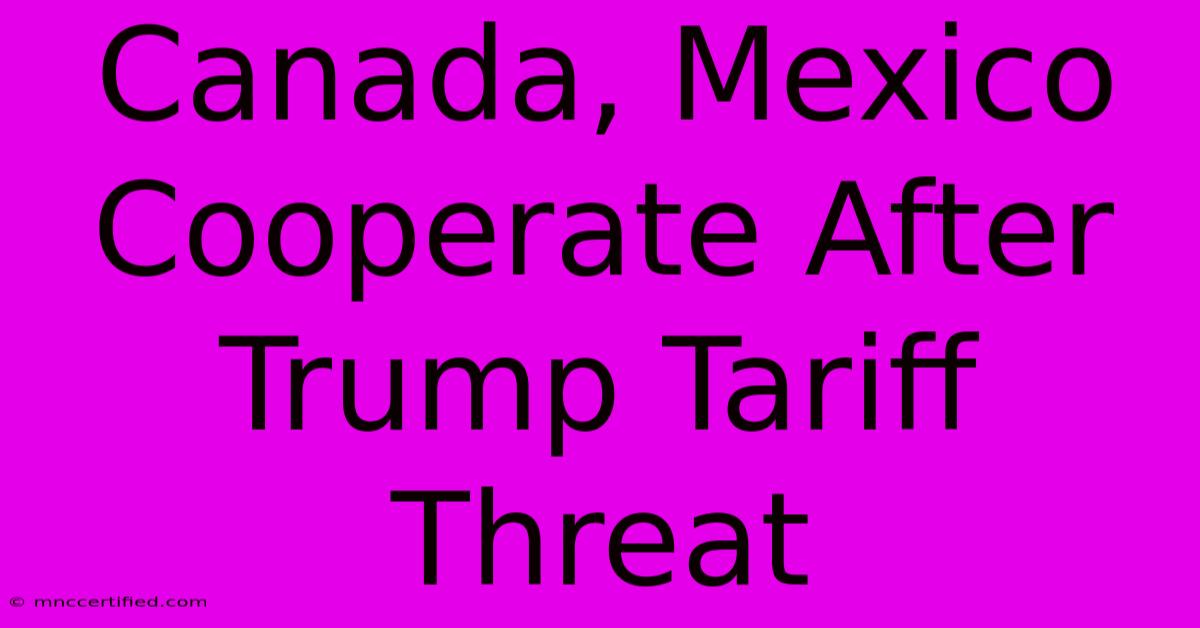Canada, Mexico Cooperate After Trump Tariff Threat

Table of Contents
Canada, Mexico Cooperate After Trump Tariff Threat: A New Era of North American Trade?
The year is 2018. A shadow looms large over the North American trade landscape: the threat of steel and aluminum tariffs imposed by the then-US President Donald Trump. This seemingly unilateral action forced Canada and Mexico, key partners in the North American Free Trade Agreement (NAFTA), into a strategic alliance, demonstrating the resilience and adaptability of their economic relationship. This article delves into the cooperative response of Canada and Mexico to Trump's tariff threat, exploring the strategies employed, the long-term impacts, and the implications for future North American trade relations.
Trump's Tariff Threat: A Catalyst for Cooperation
Trump's decision to impose tariffs, ostensibly to protect American industries, sparked immediate concern in both Canada and Mexico. These tariffs weren't simply economic sanctions; they threatened the very fabric of established trade relationships and decades of integrated supply chains. The immediate response wasn't one of isolated retaliation, but rather a swift and coordinated effort to mitigate the damage and find common ground.
A United Front Against Protectionism:
The immediate reaction was a show of unity. Both Canada and Mexico publicly condemned the tariffs as unjustified and protectionist. They highlighted the detrimental impact on businesses and consumers across North America. This unified front, a significant departure from potential independent retaliatory measures, proved crucial in influencing international opinion and exerting pressure on the US administration.
Strategic Partnerships & Diplomatic Negotiations:
Beyond public pronouncements, Canada and Mexico engaged in intense diplomatic negotiations. They collaborated on crafting a unified response, leveraging their shared concerns and economic interests to present a stronger bargaining position. This involved:
- Joint statements: Publicly coordinated statements emphasized the shared economic ties and the detrimental effects of the tariffs.
- Bilateral consultations: Behind-the-scenes discussions helped coordinate responses and explore alternative trade routes to lessen the reliance on the US market.
- International lobbying: Canada and Mexico engaged in diplomatic efforts with other countries to garner support for their position and potentially counterbalance the US actions.
Long-Term Impacts and the USMCA
The Trump tariff threat, while disruptive, ultimately served as a catalyst for significant change. The pressure to secure a more stable and predictable trade environment led to the renegotiation of NAFTA, resulting in the United States-Mexico-Canada Agreement (USMCA).
USMCA: A Modernized Trade Agreement:
The USMCA, while sharing some similarities with NAFTA, introduced significant modifications to address concerns raised by the Trump administration. These changes include:
- Increased labor standards: Higher labor standards aimed to address concerns about Mexican wages and working conditions.
- Enhanced intellectual property protection: Strengthened protections for intellectual property rights to satisfy US interests.
- Rules of origin: Stricter rules of origin for automobiles, requiring a higher percentage of components to be manufactured within the three countries.
This renegotiation highlighted the capacity of Canada and Mexico to adapt and modernize their trade relationship in response to external pressure. The resulting USMCA, despite its complexities, provided a degree of stability and predictability that was absent during the period of tariff uncertainty.
The Future of North American Trade Cooperation
The cooperative response of Canada and Mexico to Trump's tariff threat offers valuable lessons for future collaborations. The shared recognition of mutual interests and the ability to present a unified front were instrumental in navigating a difficult situation.
While the USMCA represents a significant achievement, maintaining a strong and cohesive relationship between the three nations remains crucial for continued economic prosperity. This necessitates:
- Open communication: Consistent dialogue and transparency between the governments are essential to prevent future misunderstandings and trade disputes.
- Flexibility and adaptation: The ability to adapt to changing global circumstances and evolving economic realities is crucial for long-term success.
- Mutual respect and recognition of diverse interests: Acknowledging and respecting the distinct economic and political priorities of each nation is critical for fostering trust and cooperation.
The experience of 2018 demonstrates that even under immense pressure, cooperation can yield positive outcomes. The successful renegotiation of NAFTA into the USMCA stands as a testament to the resilience and adaptability of North American trade relations. The future of this critical partnership will depend on the continued commitment to collaboration and a shared vision for economic prosperity.

Thank you for visiting our website wich cover about Canada, Mexico Cooperate After Trump Tariff Threat. We hope the information provided has been useful to you. Feel free to contact us if you have any questions or need further assistance. See you next time and dont miss to bookmark.
Featured Posts
-
Post Season Vanderpump Rules Cast
Nov 27, 2024
-
Dan Gilbert Insurance Fletcher
Nov 27, 2024
-
87 Year Old Freeman Out In Los Angeles
Nov 27, 2024
-
Sibo Test Covered By Insurance
Nov 27, 2024
-
Home Insurance Self Inspection
Nov 27, 2024